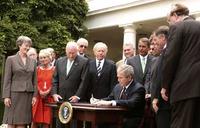-
SurveillanceFISA Section 702 reform bill a good Start, but improvements still needed: Critics
Last Wednesday, the draft of the House Judiciary Committee’s bill to reauthorize and reform Section 702 of the Foreign Intelligence Surveillance Act (FISA) was made public. Section 702 permits the government to collect the content of communications of targets who are non-Americans located abroad, including communications they may have with Americans. Critics urge Congress to pass significant and meaningful reforms to Section 702 which address the serious constitutional concerns it raises, or allow that surveillance authority to expire.
-
-
The Russian connectionRussia, Trump and the 2016 election: What’s the best way for Congress to investigate?

Exactly how will the U.S. conduct a fair and accurate investigation into Russian meddling in the 2016 election and links with President Donald Trump’s campaign? U.S. congressional leaders are discussing options. At a time when Congress is sharply polarized along partisan lines, congressional investigations tend to become microcosms of that polarization. This is all the more true when an investigation involves an issue about which the president is vulnerable to political embarrassment or attack. If the intelligence committee proves unable to conduct a thorough and bipartisan investigation of Russian meddling and Trump’s campaign, pressure will build on America’s leaders to establish a more independent probe. Hanging in the balance could be whether the United States can forge consensus about what happened and how to prevent it from happening again.
-
-
SurveillanceAdministration asks court for six more months of NSA bulk metadata collection
Just four hours after President Barack Obama vowed to sign the USA Freedom Actwhich limits the NSA’s domestic bulk data collection program, his administration asked the Foreign Intelligence Surveillance (FISA) court to ignore a ruling by the second circuit court of appeals declaring the bulk surveillance program unauthorized, and instead grant the NSA power to continue bulk collection for six months. In its request, the administration pointed to a six months transition period provided in the USA Freedom Act as a reason to permit an “orderly transition” of the NSA’s domestic bulk collection program.
-
-
TerrorismJudge rules use of NSA surveillance-based information in terrorist case is legal
Lawyers for Mohamed Mohamud, a U.S. citizen who lived in Oregon, have been denied a motion to dismiss his terrorism conviction, with the court affirming the legality of the U.S. government’s bulk phone and e-mail data collection of foreign nationals living overseas. Mohamud’s defense team claimed the surveillance violated his constitutional rights, and that federal prosecutors did not make available to the defense evidence obtained via the surveillance. U.S. District Judge Garr King upheld Mohamud’s conviction, saying that suppressing the evidence collected through NSA surveillance “and a new trial would put defendant in the same position he would have been in if the government notified him of the (surveillance) at the start of the case.”
-
-
SurveillanceA first: Constitutionality of NSA warrantless surveillance challenged by terrorism suspect
Jamshid Muhtorov, a refugee from Uzbekistan now facing terrorism charges in Colorado, is the first criminal defendant who, as part of his lawyers’ defense strategy, is challenging the constitutionality of the NSA’s warrantless surveillance program. Muhtorov filed a motion Wednesday in federal court in Denver to suppress any evidence obtained through the agency’s surveillance program on grounds that it was unlawful. In July 2013 the Justice Department reversed an earlier policy, and now informs defendants whether the case against them, in whole or in part, is based on information obtained through warrantless surveillance. To date, six months after the review process at Justice was launched, Muhtorov and Mohamed Mohamud, a Portland, Oregon teenager who had been convicted after an FBI sting operation of attempting to detonate a bomb at a Christmas tree lighting ceremony, are the only defendants to receive such a disclosure.
-
-
NSA surveillance leaksLawmakers criticize NSA leaker Edward Snowden

Lawmakers were quick to criticize Edward Snowden, the 29-year old Booz Allen Hamilton employee who disclosed the NSA surveillance program to the Guardian and the Washington Post. House Intelligence Committee chairman Mike Rogers (R-Michigan) said the national security leaks would endanger American lives. Peter King (R-New York), chairman of the Homeland Security subcommittee on Counterintelligence and Terrorism, said of the leaks: “This is a matter of extraordinary consequence to American intelligence.”
-
-
SurveillanceMajor surveillance law heading toward its own end-of-year cliff

While coverage of the tense negotiations over a resolution to the fiscal cliff threat has dominated the media, the Foreign Intelligence Surveillance Amendments of 2008 is heading for a cliff of its own, as the provisions of the act are set to expire at the end of the year
-
- All
- Regional
- Water
- Biometrics
- Borders/Immig
- Business
- Cybersecurity
- Detection
- Disasters
- Government
- Infrastructure
- International
- Public health
- Public Safety
- Communication interoperabillity
- Emergency services
- Emergency medical services
- Fire
- First response
- IEDs
- Law Enforcement
- Law Enforcement Technology
- Military technology
- Nonlethal weapons
- Nuclear weapons
- Personal protection equipment
- Police
- Notification /alert systems
- Situational awareness
- Weapons systems
- Sci-Tech
- Sector Reports
- Surveillance
- Transportation
Advertising & Marketing: advertise@newswirepubs.com
Editorial: editor@newswirepubs.com
General: info@newswirepubs.com
2010-2011 © News Wire Publications, LLC News Wire Publications, LLC
220 Old Country Road | Suite 200 | Mineola | New York | 11501
Permissions and Policies
Editorial: editor@newswirepubs.com
General: info@newswirepubs.com
2010-2011 © News Wire Publications, LLC News Wire Publications, LLC
220 Old Country Road | Suite 200 | Mineola | New York | 11501
Permissions and Policies
